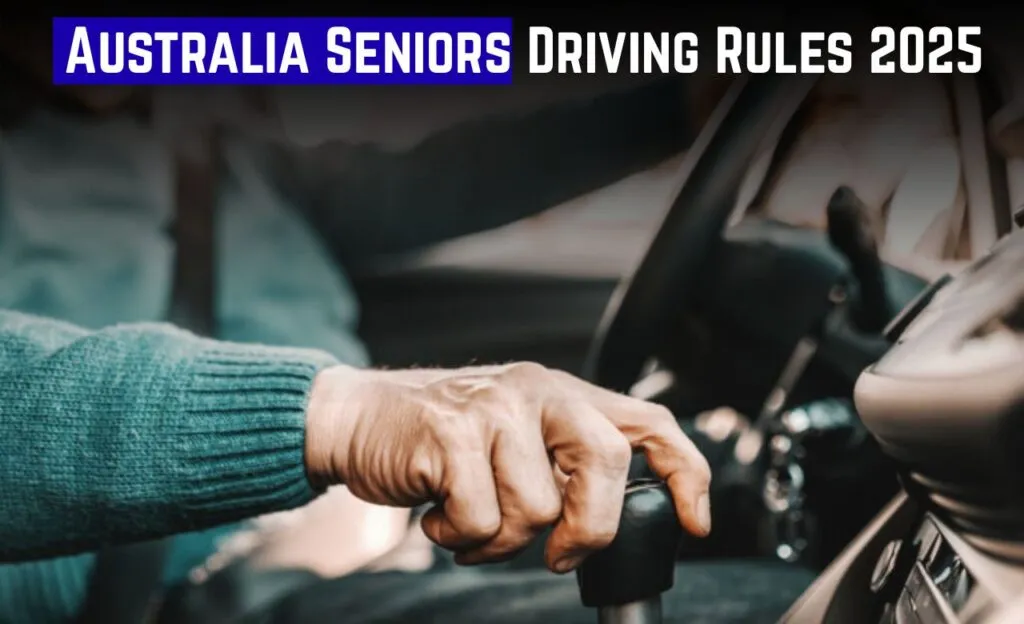Starting October 1, 2025, Australia is rolling out new nationwide driving laws for people aged 70 and above. Until now, each state had its own rules for older drivers, making things confusing for many seniors who travel or move interstate. The new update finally brings all states under one national system. The main goal is to make roads safer while also protecting the independence of older Australians who rely on their cars to get around.
What’s Changing for Over-70 Drivers
For years, driving rules varied across the country. Some states required medical checks, others didn’t. In some areas, older drivers could renew long-term licenses without issue. From October 2025, those differences are gone, replaced by a single unified set of rules that applies to every state and territory.
The changes focus on three main areas: health checks, shorter renewal periods, and conditional licenses for seniors with special needs. Let’s take a closer look at what each rule means for Australians turning 70 and beyond.
Mandatory Health Checks at Age 70
The biggest change under the new system is that every driver must complete a medical check once they turn 70 if they want to renew their license. This test will check things like eyesight, reaction time, coordination, and overall health. Doctors will look for conditions that could affect safe driving, such as vision loss, dementia, diabetes, or heart issues that may cause fainting.
This rule used to be applied randomly depending on where you lived. Now, it’s a must for everyone no matter the state. The government says this will help catch potential risks early before they cause accidents. It’s not about taking away licenses—it’s about making sure everyone behind the wheel is physically ready to drive.
These medical reviews are meant to be friendly and supportive, not intimidating. For most healthy seniors, passing should be simple. If a doctor finds issues that could affect driving, they will discuss options with the driver, such as getting special driving conditions or medical treatments before renewal.
Shorter License Renewal Periods for Over-70s
Under the new rules, older drivers can no longer get long-term licenses. Before, some people could renew their licenses for five or even ten years at once. Now, anyone above 70 must go through renewal every one to three years, depending on their medical condition.
For example:
- If your doctor says you are in excellent health, you may get a three-year renewal.
- If you have minor health issues being managed, your license might only be valid for one year before another check-in.
The renewal period will depend completely on the doctor’s assessment. This gives authorities a better picture of how aging drivers’ health changes over time, which helps improve safety for everyone. It’s also a way to support seniors with the right type of license for their situation instead of forcing a one-size-fits-all rule.
Introduction of Conditional Licenses for Seniors
A major improvement in the October 2025 update is the introduction of conditional or restricted licenses. These special licenses let older drivers continue using their vehicles but under safer, more comfortable conditions.
Some examples of these conditions could include:
- Only driving during daylight hours.
- Avoiding high-speed freeways or highways.
- Staying within a specific local driving radius from home.
The idea behind conditional licenses is to help seniors keep their mobility without putting themselves or others at unnecessary risk. It’s not meant as punishment but as a realistic support based on how an individual drives best. Someone who doesn’t see well at night can still drive during the day safely. Others who feel anxious on highways can stick to local routes where they feel more confident.
Why Australia Made This Change
Driving has always been more than transport for Australians—it’s part of independence and lifestyle. For seniors, it helps them stay connected to family, attend appointments, and stay involved in their communities. The government recognizes that taking away a license can impact mental health, isolation, and confidence. So these new laws are designed as a balanced approach.
The aim is threefold:
- Keep Australian roads safer.
- Identify health issues before they cause danger.
- Help responsible older drivers continue driving as long as they can do so safely.
Authorities say this change supports aging drivers instead of restricting them. By creating one national standard, it also removes confusion for people who move between states.
How Seniors Can Prepare for the Change
If you’re turning 70 soon or already past it, there are a few simple things to prepare before October 2025.
- Visit your doctor regularly. Routine health checkups will help you stay aware of any medical issues early, especially for vision or heart health.
- Keep your medical records updated. You’ll need these during the license renewal process. Having recent documents can save you time when your doctor completes your assessment.
- Check official driving websites. Each state’s driving authority may release small updates or extra requirements, so keeping an eye on their announcements is helpful.
- Plan your driving future. If you think you may need a conditional license down the track, plan for it early. That way you can still drive safely within your comfort zone.
Taking these steps helps you stay confident, safe, and ready for any changes. The national system is meant to assist, not burden, senior drivers.
The Bigger Picture for 2025
Australia’s 2025 driving reforms mark the first major coordinated effort to handle elderly driving on a national scale. Instead of letting each territory do things differently, the country now moves toward a simpler, fairer, and safer approach. Seniors who maintain their health and follow the checks will find the process straightforward.
The government hopes this balance between health awareness and independence will set a strong model for other countries in the future. For now, Australian seniors can feel assured that the focus remains on safety, dignity, and freedom—the right to keep driving as long as they are fit to do so.
